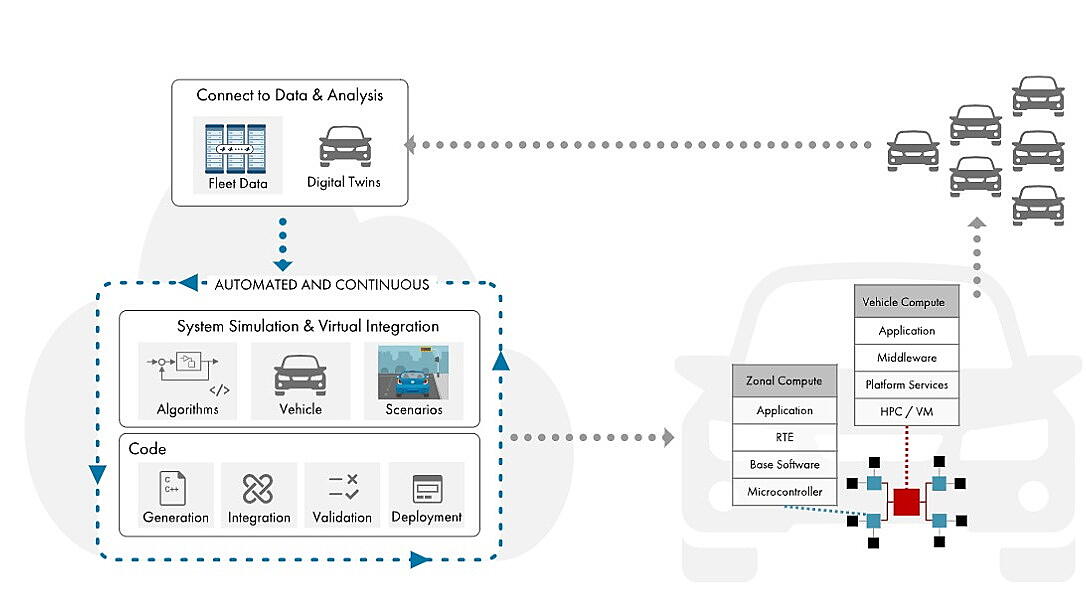
As the automotive industry shifts gears toward an increasingly digital future, the concept of the software-defined vehicle (SDV) stands out as both a game-changer and a challenge.
Combining cutting-edge software capabilities with advanced vehicle architectures, SDVs are reshaping how vehicles function, evolve, and interact with users. But what exactly is an SDV, and how does it represent a blend of evolutionary progress and revolutionary change?
Speaking to Mobility Outlook, Jim Tung, MathWorks Fellow, explained that at its core, an SDV is a vehicle where software takes centre stage in defining, delivering, and updating key functionalities. It shifts the focus from traditional mechanical components to a more dynamic, software-driven approach.
According to him, the SDV represents a dual transformation. On one hand, it is an evolution of electrical and electronic architecture, transitioning from numerous electronic control units (ECUs) to more powerful high-performance computers (HPCs) that can handle updates seamlessly. On the other hand, it marks a revolution in software development, requiring larger, more collaborative teams and innovative engineering processes.

The Role Of Software In SDVs
While consolidating hardware through HPCs might suggest simplification, the reality is quite the opposite when it comes to software. The transition involves more complex and expansive software ecosystems. Beyond infotainment and advanced driver assistance systems (ADAS), SDVs require sophisticated software for zonal controllers and other integrated systems. This increased functionality and the ability to update software over time mean that the total volume of software code is set to grow significantly, even as the hardware architecture becomes more streamlined, he noted.
Is Quantum Computing The Future Of SDVs?
Quantum computing often emerges in conversations about transformative technologies, but its role in SDV development remains in the optimisation phase. Rather than directly speeding up software coding, quantum computing could address complex optimisation problems in science and engineering, which indirectly benefit SDV development. “Tools like MathWorks’ MATLAB add-ons for quantum computing are already being used to tackle such challenges. However, the more immediate game-changer for software development in SDVs is generative AI, which is expected to significantly accelerate coding processes in the near term,” Tung said.
MathWorks: Powering SDV Revolution
A key enabler in the SDV transformation is MathWorks, which provides advanced tools and methodologies to streamline software development. Through model-based design, MathWorks empowers developers to generate reliable software that undergoes rigorous testing via system simulations and virtual driving scenarios. This approach not only enhances safety and reliability but also reduces costs by minimising reliance on physical testing.
By integrating modern technologies such as continuous integration and cloud-based methods, the company ensures that software development remains scalable, efficient, and automated. Its tools align system engineering practices with cutting-edge software development techniques, enabling developers to create, test, and update SDV features with precision and speed.

India's Role In SDV Landscape
India’s automotive market offers fertile ground for the SDV revolution. With a tech-savvy, young population that values personalisation and connectivity, and a mix of domestic and multinational OEMs embracing digital transformation, India is poised to make significant strides in this space. MathWorks is actively supporting Indian customers in developing SDV functionality for both local and global markets, ensuring scalability and consistency across teams, he pointed out.
Cybersecurity In SDV Era
While MathWorks does not directly focus on cybersecurity, it plays a crucial supporting role by ensuring that the code generated through its tools adheres to stringent cybersecurity standards. By emphasising secure, robust, and reliable software development, MathWorks helps developers meet the growing challenges of ensuring safety and security in SDVs, he pointed out.
Future Defined By Software
The advent of SDVs is both an evolution of automotive engineering and a revolution in digital innovation. With technology giants like MathWorks at the helm, the transition to SDVs promises to deliver more personalised, connected, and efficient mobility solutions. As the industry accelerates into 2025 and beyond, SDVs are not just redefining vehicles—they are reshaping the entire mobility ecosystem, with India and the world watching closely.
Also Read:
MathWorks Exhibits Agility, Adapts Swiftly To Meet Customer Demands

